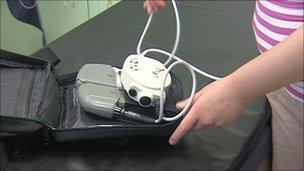Heart pump 'mends' Airdrie woman's heart
- Published
A 27-year-old woman whose heart stopped beating on the operating table has been saved by a Nasa-inspired heart pump.
Mother-of-three Heather McIntyre, from Airdrie, suffered heart failure last July, five months after giving birth.
A surgeon at Scotland's Golden Jubilee National Hospital kept her alive by massaging her heart and inserting a Ventricular Assist Device (VAD).
It uses tiny motors designed by NASA scientists to pump blood around the body, taking over the heart's function.
While Ms McIntyre was on the operating table, her family were told she had died "a couple of times" because her heart had stopped beating.
However, cardiothoracic surgeon Saleem Haj-Yahia refused to give up on her.
"All her organs failed: kidneys, liver, lungs and heart," he said.
"She needed a very quick resuscitation which required taking her immediately to theatre.
"We needed to open the chest and massage the heart, while implanting the device."
Ms McIntyre said her family was told she had just a 5% chance of survival, but over the following weeks her heart, and other organs, started to recover.
She said: "My heart started to recover because it was getting that wee rest. Well that's what they think anyway. They said that is what basically saved my life."
'Vital development'
The Golden Jubilee hospital in Clydebank is one of only a handful of hospitals in the UK to use VADs.
The device is usually used as a temporary measure while a patient waits for a transplant but for a small number of people their own heart recovers after a break.

There are different types of VADs,including the portable device used by Ms McIntyre
It is hoped that once its clinical effectiveness is fully proven, VADs could be used as "destination" therapy for patients who are not eligible for transplant.
It is a vital development, according to heart specialist Dr Mark Petrie.
"In the past we were limited to drugs and pacemakers but now we can actually take over the function of the heart and drive blood around the body so it's a huge benefit for patients who are acutely sick," he said.
Unfortunately surgeons at the Golden Jubilee had to amputate Ms McIntyre's left leg, which had been severely damaged by a blood clot caused by her heart failure.
However, Ms McIntyre is already walking on crutches and is full of optimism for the future.
"I'm fine about it," she said.
"I've got a prosthetic leg. I'm home with my kids. I'm not going to sit in the house and cry because I've lost my leg or I've got scars.
"I'm going out and I see more people than I ever did and I feel so good."
Meanwhile the Scottish government launched a new heart failure strategy at the Golden Jubilee National Hospital, which aims to improve access to experts, increase the number of heart transplants, and enhance the VAD service.
- Published14 February 2011
- Published27 September 2010